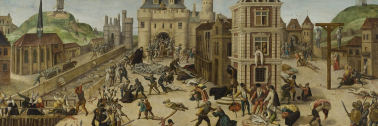As a doctoral student at UCLA, I developed an interest in the literature of conflict, particularly of the French Wars of Religion (1562-1598). It was during this time that I became acquainted with the vast, but understudied and under-appreciated corpus of polemical pamphlets. As I devoted more attention to this unique genre, it quickly became clear that one of the greatest obstacles to research was the general inaccessibility the original texts. These pamphlets were not – for the most part – great literary works that collectors would have preserved in personal libraries. In general, they were hastily written and inexpensively printed; produced in and for a particular moment. Immediate effect was their purpose. Conservation was an afterthought. Most copies were lost or destroyed. Surviving examples gradually deteriorated. Today, the relatively rare extant copies are hidden away in the rare books collections of libraries throughout Europe and North America.
Over the years, this has not necessarily been seen as a problem by the larger academic community. Largely lacking in traditional literary quality, polemical pamphlets did not make it into the literary canon and, thus, did not attract much attention from scholars. Nevertheless, these pamphlets provide invaluable insights into the culture of the time, adding context to the conflict and and filling in gaps in official histories. What they might lack in literary quality, they more than make up for in historical value. But are they really devoid of literary value? I would emphatically argue that they aren’t. Though non-traditional in many respects, the authors of these pamphlets developed creative rhetorical techniques to embody their equally inventive political and theological strategies. For this and many other reasons, sixteenth-century polemical pamphlets deserve to be studied, which brings us to this project.
As I began to search out and study pamphlets in libraries throughout France, it became clear, particularly given the length of some of the works (200+ pages) that a serious study would require more time than I could spend in the library. Some libraries, like the Bibliothèque nationale de France (BnF), are digitizing many of these rare works. However, the digital formats do not always lend themselves to the full range of modern research methods. Scanned as images rather than text, the contents are not searchable or analyzable using digital humanities methods. I realized that transcribing the pamphlets would give me not only continued access to the content, but it would permit me to trace the rhetorical evolution of the intellectual conflict that accompanied the Wars of Religion.
It was at this point that I reached out to my colleague and old friend, Jeremy Browne, an expert in digital humanities. With Jeremy’s DH insights and programing background, the project grew from an individual academic pursuit to a public-facing research tool that will eventually contain a considerable library of pamphlet transcriptions with integrated online research tools.
Through the generous support of the BYU College of Humanities and Mentoring Environment Grant program, we have been able to offer unique educational experiences to undergraduate students as well. Over the past two years, I have made two trips to France (one with students), where we have photographed nearly 4,000 pages of text. Under my supervision and using bespoke software created by Jeremy, the students prepare the photographs for an OCR application and then correct the digitally-produced transcriptions.
The first few pamphlets are now available in plain text format on the website with several more to be added in coming months. This is expected to be a longterm project that will be completed in phases. The first phase is focused on the most prolific Catholic polemicist of the time, Artus Désiré. Future phases will include a broader range of authors from both sides of the confessional divide.
Christopher M. Flood
